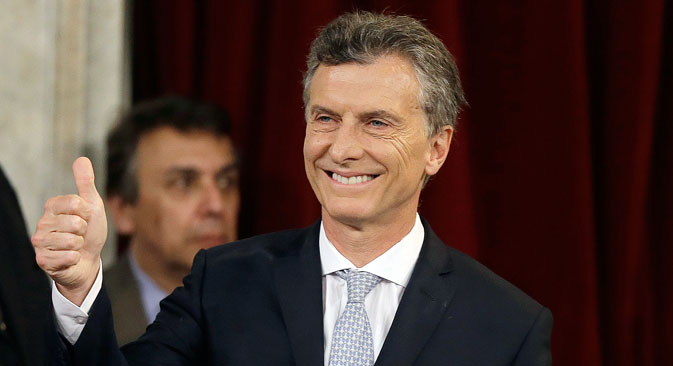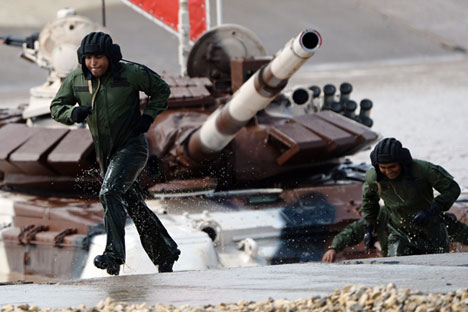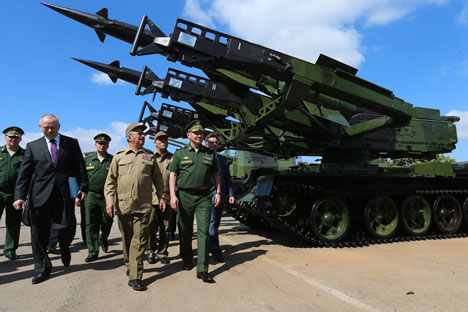Press Digest: Will new Argentinian leader maintain relations with Russia?

Mauricio Macri gives a thumbs up after being sworn in as new president at the Congress in Buenos Aires, Argentina, Thursday, Dec. 10, 2015. Macri was sworn in, inheriting myriad economic problems from the often divisive outgoing President Cristina Fernandez, who skipped the inauguration in a final sign of defiance that underscored deep polarization in the South American nation.
APKremlin to dance Argentinian tango with new partner
The Vzglyad business newspaper writes that Argentina’s new president Mauricio Macri intends to restore the best relations possible with the U.S. However, Moscow and Buenos Aires have every chance of remaining close: Secretary of the Russian Security Council and close Putin associate Nikolai Patrushev was present at Macri's inauguration on Dec. 10.
Towards the end of Cristina Kirchner's second term as president of Argentina, Russian-Argentinian relations had reached unprecedented heights. They concerned not only the increased commodity turnover between the countries but also many potential joint projects in the energy and military fields.
However, during the last presidential elections, Kirchner's fellow party member Daniel Scioli lost to liberal Macri, who said that if he came to power he would possibly terminate the contracts signed with China and Russia in the field of nuclear energy and the construction of hydroelectric power plants in Argentina.
It is obvious, writes the newspaper, that liberal Macri will try to improve relations with the U.S., but the enormous commodity turnover with China and the serious plans with Russia are beneficial for Argentina.
It is also clear that the U.S. will try to use Macri's presidency for its own interests, the most important of which is the destruction of a broad front of leftist countries opposing Washington's pressure. For example, relations between Argentina and Venezuela will worsen, and this could become a significant test for the unity that has just begun to form in Latin America.
Russian Foreign Ministry will intervene to liberate sailors in Libya
The daily broadsheet Izvestia reports that Astrakhan Region Senator Igor Martynov has sent a request to the Russian Foreign Ministry asking it to intervene and liberate the crew of the Russian tanker Mekhanik Chebotarev, currently being held in Libya.
"As you know, on Sept. 16, Libyan soldiers captured the Russian tanker Mekhanik Chebotarev and its crew in neutral waters and without explanation. Some members of the crew were released but others remain in detention,” says the senator's request.
“On Dec. 1, while I was receiving the public, I was visited by a resident of the Astrakhan Region, O. V. Klimenkova, who told me that her son Nikolai Klimenkov, born in 1993, is still in the Libyan prison along with other crewmembers. Although the Libyan government has promised to liberate the detained sailors, the woman doubts that the Libyan side will do as it promised," the request reads.
Ramzan Kadyrov, president of Russia’s Chechen Republic, has joined the effort to liberate the sailors. After speaking with Libya's prime minister, Kadyrov has reached an agreement to free two individuals.
Sergei Markov, head of the Institute of Political Studies in Moscow, fears that Libya's treatment of the crewmembers could harshen since Russia is participating in the war against Islamic State (ISIS). Nevertheless, he believes that the Russian government will do everything in its power to secure the release of the sailors from the Mekhanik Chebotarev.
FIFA to receive lion’s share of income from Russia’s World Cup
The RBK business daily writes that Russia's proceeds from the 2018 World Cup will be more than 10 times lower than the expenses for its organization. Meanwhile the revenue that FIFA will receive will amount to a record $6.4 billion.
FIFA's 2014 accounts show that its main income for organizing the World Cup comes from the sale of TV rights, revenues from the main sponsors, and the sale of license rights for using World Cup symbols, ticket sales and hotel licensing. However, the host country, which bears all the costs of preparing the championship, receives only a part of the ticket revenues. The rest of the money goes into FIFA's budget.
According to an estimate made by valuation company Swiss Appraisal, total revenues from ticket sales for the World Cup in Russia will amount to $782 million. A big part of this money will most likely remain in Russia.
However, TV rights and proceeds from sponsors bring the organizers much more profit than ticket sales. But these revenues, in accordance with FIFA's norms, do not remain in the host country.
Back in August Russia's expenses for the 2018 World Cup were estimated at $16.8 billion. Russia is not disclosing the profit it expects to make.
All rights reserved by Rossiyskaya Gazeta.
Subscribe
to our newsletter!
Get the week's best stories straight to your inbox

